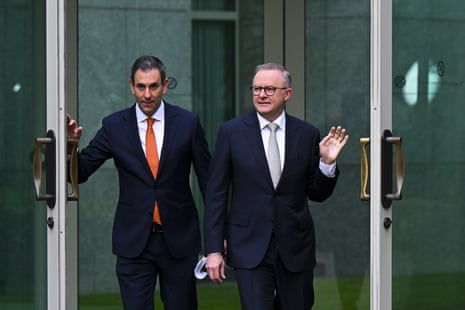Extract from The Guardian

The first involved the stage-three tax cuts. Before the October budget Chalmers attempted to create some room for trimming a package that’s unaffordable and regressive. Things got hot, and Albanese ended the first round of that conversation.
Round two is playing out now. Chalmers is making the case to cap superannuation balances at $3m. The policy objective is trying to limit the cost of generous tax concessions while returning super to its original purpose: providing income for a dignified retirement. People on modest incomes don’t have the opportunity to engage in tax-effective estate planning, but wealthy Australians do, and super has become a vehicle for doing that.
The policy case for capping balances is so logical it makes itself. But logic isn’t the default. The default is apocalyptic screeching anytime anybody stands to lose anything at all.
Given the persistence of the screeching, and the proximity of the Aston byelection, it’s unclear whether round two will go the way of round one. It’s important to be clear about this though. If we can’t agree as a polity that generous super tax concessions provide disproportionate benefits to people who really don’t need the help, while depriving the budget of funds for services that we all need and value, then things are really cooked.
Given we find ourselves at this depressing juncture, it might be productive to ask why things are this cooked. It’s only fair that I start with one of the biggest impediments to sense. My own profession.
What follows is a generalisation, so reductive and unfair by definition. But I suspect many readers will grasp the kernel of truth. Journalists like to think we keep politicians accountable. At our best, we do. But we also engage in a lot of what I’d call performative (as opposed to substantive) accountability.
The internet has really supercharged this as a phenomenon because the digital economy is all about engagement. Think back to the election last May. The daily hustings combat was staged in a fishbowl – cameras pointed both at political leaders and at journalists. Aggro encounters can lead a news bulletin and drive engagement on websites and social media platforms.
Albanese was a challenger, not incumbent. Opposition leaders are expected to prove themselves and the tests are often arbitrary. In 2022, there were two categories of questions. The first I’ll call pub trivia. (What’s the cash rate/can you recite the five elements of your health plan and the 10 footnotes on page 45). The second was the rule-in rule-out game. (Will you increase taxes/cut spending/live in Kirribilli after Saturday/ever eat carbs again).
To be clear: we put politicians in a corner, then we berate them for crouching there
Pub trivia was just plain dopey. A battle of the brands; journo X jousts with politician Y, Hustings Survivor, see it first at 6pm, followed by End Times at 8pm. The rule-in rule-out game is an election standard as old as time, and sadly, the effects are cumulative. The cumulative impact of rule-in rule-out is simple: politicians rule in new spending, and they rule out any savings or revenue measures to pay for it – a compounding disaster in budgetary terms.
Looping back to performative accountability, our collective frolic in 2022 involved treating the likely next prime minister of Australia like he was a contestant on Mastermind before inviting him to rule out doing a bunch of difficult things that everyone present knew full well needed doing.
It didn’t end there. Having made sure the alternative prime minister of Australia was hemmed in by election promises we elicited through arbitrary interrogations, we then tend to moan among ourselves on political talk shows about how timid politicians are.
To be clear: we put politicians in a corner, then we berate them for crouching there. This goading persists for as long as it takes for a prime minister or a treasurer to edge out of the corner, and try and do something. Then the apocalyptic screeching starts.
The point of spelling this out is to be transparent. Performative accountability “wins” every stage of this battle. We win Mastermind. Then we win no new taxes. We win where have all the great reformers gone? Then we win look at that idiot breaking an election promise, doesn’t he know there’s a byelection in Aston in a month?
Performative accountability wins. And the country loses.
Being self-aware about this, being honest about this peculiar roundabout we are on, opens the possibility that we can carve out accountability territory that has purpose and meaning.
Instead of bobbing like corks in our boiling ocean, coarsened by ceaseless clamour and contention, isn’t it better to make choices? Journalists can choose to be participants in a higher quality democracy. We can try and do some good rather than dish up instalments of sideshow.
The other problem is the persistence of drive-by partisanship, which feels like a related form of nihilism. The internet’s voracious appetite for conflict and confirmation bias drove for-purpose journalism into a cul-de-sac, and Tony Abbott drove politics off a cliff.
Nope, nope, nope; Abbott’s enduring trope. Peter Dutton is an Abbott tribute band. It’s hard no to superannuation reform, even if the Coalition was advised to take the same policy steps in government. Hard no to the safeguard mechanism, even if we started the redux under Scott Morrison. Lurching between soft no and hard no on the voice to parliament.
In political terms this is a black hole strategy. A great sucking vacuum of negativity. So these are arid conditions. It will be hard politically for Labor to pursue any budgetary reform that could be considered difficult.
A country that prides itself on equality of opportunity is on a fast track to institutionalising haves and have nots.
Given that, I found myself thinking about Philip Lowe this week. I’m certain the government is grateful at this juncture for Australia’s independent monetary policy. Lowe has become the national flack catcher – several steps removed in his cloister at Martin Place – chasing down his inflation dragon. The government can say (and has been) interest rate hikes are on the bank, not us.
Imagine if it was the government setting interest rates. Just imagine just how apocalyptic the screeching would be at this point. But Lowe doesn’t have to care about the exigencies of the Aston byelection, or any other short term political calculation. He just uses the tools at his disposal to try and grapple with the challenge stipulated in his charter.
It made me wonder whether there were any viable models for an independent fiscal policy that might serve the national interest more effectively than politicians having to navigate the Punch and Judy show. Having a private reverie about taking responsibility for the budget away from a democratically elected government because that feels like the only viable means of achieving a national interest outcome helped me land with a jolt. If we get to that nadir, what is politics for?
So, like journalists, politicians have choices. One choice is to take responsibility for dousing the bin fire.
Capping super balances is an important fight to have because it is a microcosm of one of the big challenges Australia faces. Right now, a country that prides itself on equality of opportunity is on a fast track to institutionalising haves and have nots. Do we want to live in an Australia divided between people who possess all the assets and all the advantages and people who can’t meet their potential because the system is rigged to reward the winners? If we don’t want to live there, then looking at generous tax concessions has to be part of the mix, even if someone doesn’t get to stash $5m in their super fund.
Exercising choices takes courage. It takes leadership. It takes cut-through and, sometimes, crash through. As David Byrne would have it in Once in a Lifetime, the Talking Heads anthem about waking up dazed at the end of the path of least resistance – same as it ever was.

No comments:
Post a Comment